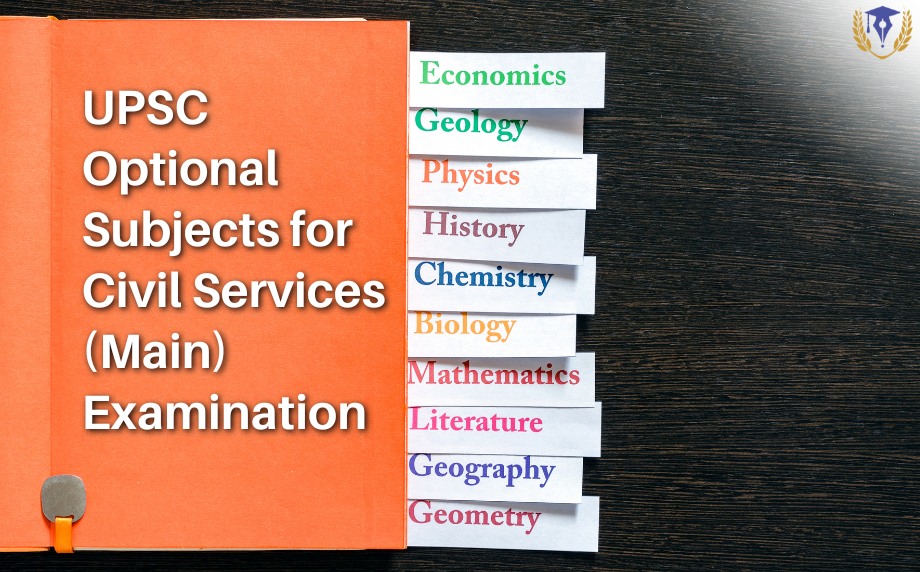You have complete freedom to select the optional subjects of your choice for the UPSC Mains Exam, the second tier of the IAS examination. Do you know which optional subject for the UPSC is the best? For UPSC candidates, the optional subject has a significant impact on their score differentiation.
Papers VI and VII, two of the nine total papers in the CSE Main exam, are from the UPSC optional subject. Optional Subject Paper 1 and Optional Subject Paper 2 are these. Each of them is worth 250 points. Therefore, in the UPSC Mains Exam, the UPSC optional subject is worth 500/1750 points. For the purpose of preparing the final merit list, the marks earned in the optional UPSC subjects are taken into account.
Decide carefully when selecting an optional subject for UPSC. The question “How to choose the best optional subject for UPSC” is still one of the most frequently asked by UPSC aspirants because candidates are only required to choose one optional subject, unlike in the past. The optional subjects for the UPSC that a candidate may select are listed in this article. To choose the best optional subject for the UPSC, you must follow a well-thought-out strategy. The syllabus and preparation plan for each subject is available by clicking on the links.
The optional subjects for the UPSC that a candidate may select are listed in this article. However, the best optional subject for UPSC selection must be made using a professional strategy. You can click on the links to view the syllabus and preparation plan for the specific subject. Also with preparations focus on effective UPSC Online Mock Test series.
The importance of choosing the right optional subject for the UPSC
The UPSC optional subjects are crucial to success in the UPSC CS Main Exam. Out of a possible 2025 mark, 500 are included in it. These 500 points can significantly affect your final score if you make the right decision. Depending on the candidate’s educational background, the best UPSC optional subject from the list of UPSC optional subjects may be defined differently by each candidate.
Most students make the error of selecting optional UPSC subjects based on the subject’s top scorers or due to other considerations like popularity, the availability of study groups, etc. However, you should exercise extreme caution when selecting an optional subject on such grounds, as it might cost you a try! When you choose an optional subject, start looking for UPSC Online test series to start preparing for the exam.
Most Scoring Optional in UPSC
The most crucial part of the UPSC exam is optional subjects. The optional subject should be carefully and wisely chosen by the candidates. To perform well in the interview as well as the written exams, you must give the optional subject your full attention. The optional subjects that candidates choose should be carefully considered because they will impact their final UPSC exam score. The UPSC optional subjects with the highest scores are listed below.
1. International and political relations
It was already a well-liked non-technical subject, but Tina Dabi of AIR 1 made it optional. There are numerous reasons why this is regarded as one of the best and highest scoring optional subjects in the UPSC.
Although having a background in political science will undoubtedly give you an advantage, the subject is simple enough for anyone to understand.
You can learn something about any exam question if you have a basic understanding of the subject, keep up with current events, and regularly read editorials.
2. Anthropology
One of the top optional subjects at UPSC is anthropology. Due to the subject’s emphasis on scoring, more candidates are choosing it. Although none of the top scorers over the past ten years chose anthropology as an optional subject, many students from other ranks did so and also did well.
For individuals who are considering anthropology? It is, in fact, the study of human societies and how they have evolved. To be more precise, anthropology is the study of the biological and physiological characteristics of humans as well as their evolutionary history.
3. Sociology
In the UPSC exam, sociology can be a high-scoring optional subject for candidates who have already completed some foundational coursework in the subject. What is sociology? It is the study of social structure, interpersonal relationships, cultural practices, etc.
Another excellent and high-scoring optional subject for the UPSC Mains is this one. It is also one of the simpler subjects that the UPSC offers. There is a tonne of information and advice available on the subject because it has historically been an optional decision among aspirants.
4. Public Administration
Public Administration has grown significantly in popularity since it was first added to the Mains optional list in 1987 and is a top choice among candidates. Additionally, compared to some other non-technical subjects, this subject has a higher success rate. Due to all of these factors, it naturally ranks as one of the best optional subjects and the highest scorers in the UPSC.
It is extremely important to your upcoming position as an administrator. Understanding the environment you will eventually work in will be aided by topics like Accountability, Personnel & Financial Administration, Organisations, etc. from Paper I as well as the entirety of Paper II’s subject matter (Indian Administration). This makes the topic extremely relevant and important. There are numerous UPSC mock tests available for Public administration that will boost your preparations for the exam.
5. Philosophy
It is the study of information, morals, the human condition, the mind, language, etc. In comparison to History, Geography, Public Administration, and Political Science, Philosophy had a success rate of 7% on the UPSC exam in 2015–16. Additionally, Athir Amir, CSE 2015, Rank 2, chose it as his subject of study.
Your interest in philosophy should be the primary factor in deciding whether it is the best optional subject for the UPSC. As you read about Indian philosophy This is the topic for you if you enjoy both the thinking of great Indian philosophers and those from other cultures.
These were a few non-technical subjects that are among the best UPSC optional subjects you can choose from. Your interest in the subject is the only consideration, as it is essential to success.
How do I select an optional subject for the UPSC?

For the Civil Services Exam, UPSC offers 48 optional subjects. Candidates may select any one of the optional subjects and take two papers in that subject. The important considerations one should keep in mind when selecting optional for UPSC are as follows:
- Read through the list of elective subjects offered by UPSC, reduce your choices to three or four, and make sure the subjects you select are comfortable.
- After reducing your options, review the UPSC previous year’s question papers for that optional subject to assess your position and determine whether you are confident in your ability to interpret the demands of the question.
- Additionally, the accessibility and availability of study materials are common factors in choosing an optional subject.
- To master the topics of an optional course and to practice answering questions, study materials, and coaching services become essential.
- When selecting an optional paper, interest should come first, and other considerations, such as overlap with the UPSC General Studies syllabus and background knowledge, should come second.
It is all a matter of perspective when it comes to the best way to select an option for the UPSC. Regardless of the elective you select, success depends solely on your ability to put forth the necessary effort. Therefore, once you’ve chosen an option, be sure to stick with it and be persistent.
Considerations for selecting an optional subject
Here are some criteria you might take into account as you select the best option from the UPSC’s list of optional subjects:
1. Cross-referenced Syllabi
A few elective subjects, such as history, Political Science & International Relations, Sociology, Geography, Economics, and Public Administration, are wrapped by the General Education curriculum for both the Prelims and the Mains. Thus, it could help you save some time on preparation.
2. Comprehensive Curriculum
Right now, you need to finish an essay based on your merit and four General Studies papers. You will need to devote more time to studying for an option if the syllabus is lengthy. Consequently, choose a subject that you can easily finish in the allotted time.
3. Competitiveness
According to some applicants, an excellent UPSC optional subject is one with a high rate of success in regard to the number of applicants who show up as the preferred candidates. It is, however, only partially accurate. More than anything else, the readability of your response will be taken into consideration when judging your copy. Therefore, pick a subject that you are familiar with.
4. Resources that are accessible
Currently, there are 47 optional subjects available, but there is a dearth of teachers, study materials, and pertinent books. Even though online education has made it possible for you to access more resources while lounging at home, it is crucial that you assess your options based on the resources that are readily available.
5. Knowledge of the topic
When selecting the best optional subject for the UPSC, familiarity with the subject is another crucial factor to take into account. Your choice should be based on whether you already have that course as a requirement for graduation or further study. On the other hand, select a subject that you can study repeatedly without getting bored.
In addition to these, evaluating the optional subjects may take into account elements like relevance to the job role for the civil service, a common subject choice among high rankers, scoring potential, and comfort level with the subject.
Which is the best elective subject for the UPSC?
Some subjects receive higher scores than others. The IAS top scorers have 320+ in both technical and non-technical subjects, though, if we look at the bigger picture. Because candidates are unable to put forth the necessary effort or because they chose an optional subject that is not best for them, some subjects are perceived as having low scores.
You can achieve high marks in technical subjects because the solutions are unambiguous (such as mathematics). In general, the examiner’s biases or preferences don’t matter as much for sciences as they do for humanities subjects. Moreover, non-technical subjects offer more overall time to prepare and books to read, especially those that partly intersect with the GS syllabus, raising the total amount of preparatory time needed.
Which optional subject for the UPSC is best depends on a variety of factors. The following six questions a candidate must ask themselves before choosing a topic
- How large is the optional course syllabus?
- How long do you have to get ready?
- Have you previously studied the subject at the graduate or postgraduate level?
- How much of your optional choice’s syllabus overlap with the GS section in Prelims or Mains?
- Are the coaching and study materials easily accessible?
- Do you possess the necessary motivation or interest to study the subject for the UPSC test?
A candidate should “individually” decide which UPSC option is best for them based on their responses to the preceding six questions.
Conclusion
The UPSC optional subjects that are offered for the UPSC Main Examination were briefly described in the foregoing. Before selecting optional, review the UPSC’s comprehensive exam syllabus.
You can choose from a variety of thorough UPSC online test series provided by Exampay, all of which are guaranteed to lay a solid foundation. Check out the website to see the full list of courses and available UPSC Online Mock Test.







